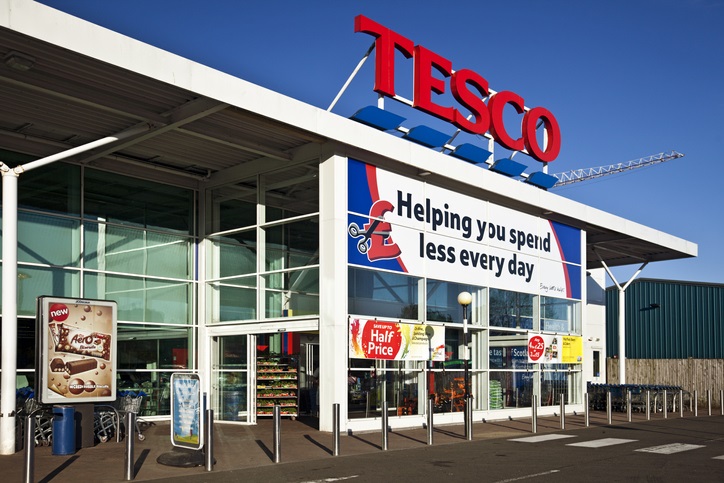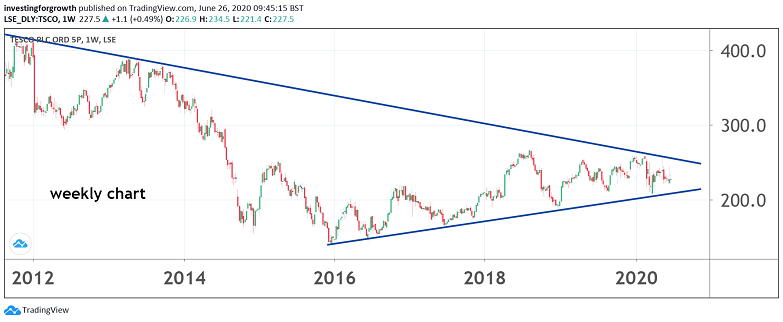Why Tesco remains the City’s favourite grocer after Q1 results
With the shares in a long-term uptrend, our head of markets discusses the preferred play in the sector.
26th June 2020 10:07
by Richard Hunter from interactive investor
With the shares in a long-term uptrend, our head of markets discusses the preferred play in the sector.

The pandemic remains the central theme and Tesco has certainly stepped up to the plate in response.
The full-year results in April made mention of the 30% uplift in sales in the midst of panic buying. Now, a more even assessment can be made, and like-for-like first quarter sales showing an increase of 8.2% are proof that Tesco is maintaining its dominant position.
Within this number for the 13 weeks ended 30 May, online sales rose 48.5% in the period (and 90% in May) as the group was galvanised into action, increasing capacity to 1.3 million orders per week versus a previous 600,000, and at a minimal cost of £4 million. This in turn has resulted in a projection of sales totalling £2 billion through this channel for the year.
- Supermarket shares: the ones to buy and sell
- Five most-held dividend stocks among the biggest income funds
- Coming soon: More fund manager videos. Click here to subscribe
The improvement in sales resulting from the outbreak has, not surprisingly, been mirrored elsewhere within the group. Convenience stores sales rose 9.9% in the UK, Booker’s retail sales improved by 23.5% and Jack’s, which has not featured in previous updates, is now running on sales of £100,000 per week.
Overall, despite the fact that shopping frequency has dropped by a third, this has been more than offset by a basket size which has increased by two-thirds. The Aldi price match is showing some signs of success, and there has been a noticeable increase of customers buying non-food items as the lockdown bit, such as toys, electricals, stationery and general home goods.
Nor has Tesco been resting on its laurels strategically. The previous acquisition of Booker is looking to have been an increasingly astute move, the tie-up with Carrefour will provide further firepower, and the disposal of the Asian unit, when agreed, should add a further £8 billion to the coffers. In addition, Tesco has decided that the Polish unit is surplus to requirements and the sale is progressing and expected to raise some £180 million.

Source: TradingView. Past performance is not a guide to future performance.
Inevitably, not all is plain sailing.
Tesco’s latest estimate of incremental costs, due to the additional financial strain of distribution, the employment of 47,000 extra staff and the payment of sick pay to a significant number of staff, is £840 million. This remains within the previous guidance of between £650 million and £925 million, and puts into sharp perspective that the business rates relief of around £530 million and additional sales is not one-way traffic.
At the same time, the likes of Bookers has suffered as businesses have had to scale back, with catering sales down 32% and Best Food sales down 70%, although this has more recently improved to minus 50% as customers begin to reopen.
Another potential red flag is Tesco Bank, where an increase in bad debt provision is likely to contribute to an estimated loss for the year of between £175 million and £200 million.
Even so, Tesco has clearly responded rapidly to the challenges emanating from this unique set of circumstances, while also managing to keep a hand on the strategic tiller.
- Ian Cowie: sticking with 10 winning trusts
- Take control of your retirement planning with our award-winning, low-cost Self-Invested Personal Pension (SIPP)
The shares have shown a classic defensive quality, edging ahead slightly over the last three months and having declined by just 1% over the last year, as compared to a decline of 17% for the wider FTSE 100 index.
The company comfortably remains the preferred play in the sector, with the market consensus of the shares as a ‘buy’ holding firm.
These articles are provided for information purposes only. Occasionally, an opinion about whether to buy or sell a specific investment may be provided by third parties. The content is not intended to be a personal recommendation to buy or sell any financial instrument or product, or to adopt any investment strategy as it is not provided based on an assessment of your investing knowledge and experience, your financial situation or your investment objectives. The value of your investments, and the income derived from them, may go down as well as up. You may not get back all the money that you invest. The investments referred to in this article may not be suitable for all investors, and if in doubt, an investor should seek advice from a qualified investment adviser.
Full performance can be found on the company or index summary page on the interactive investor website. Simply click on the company's or index name highlighted in the article.